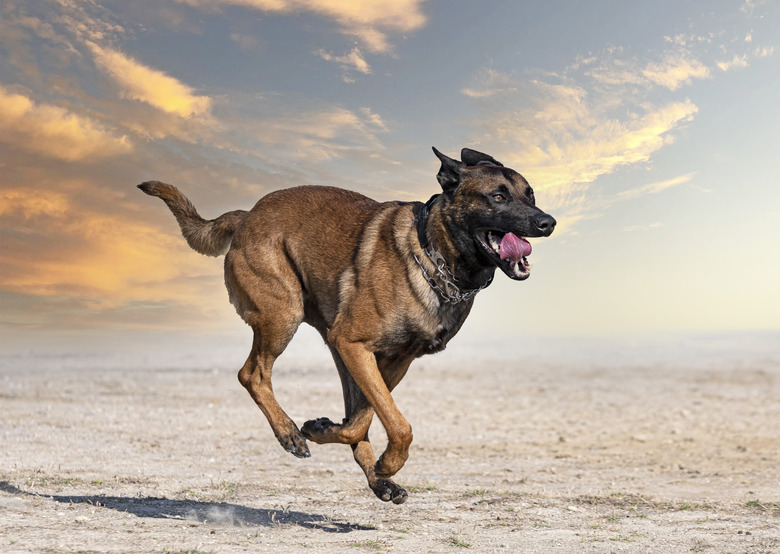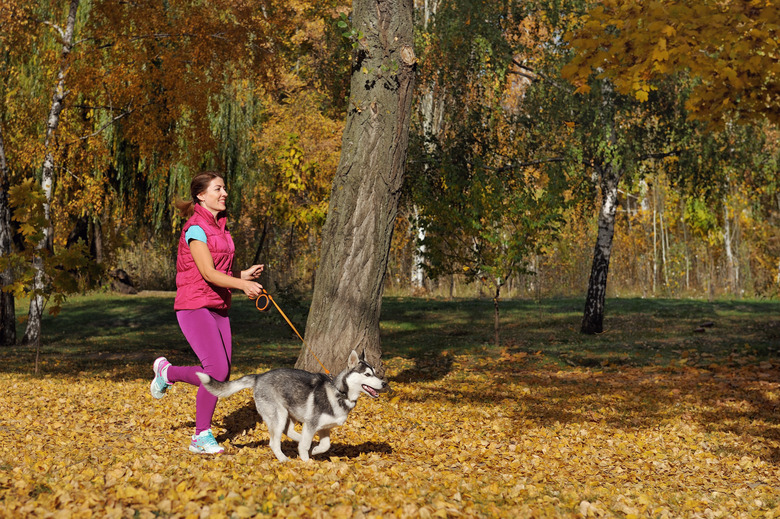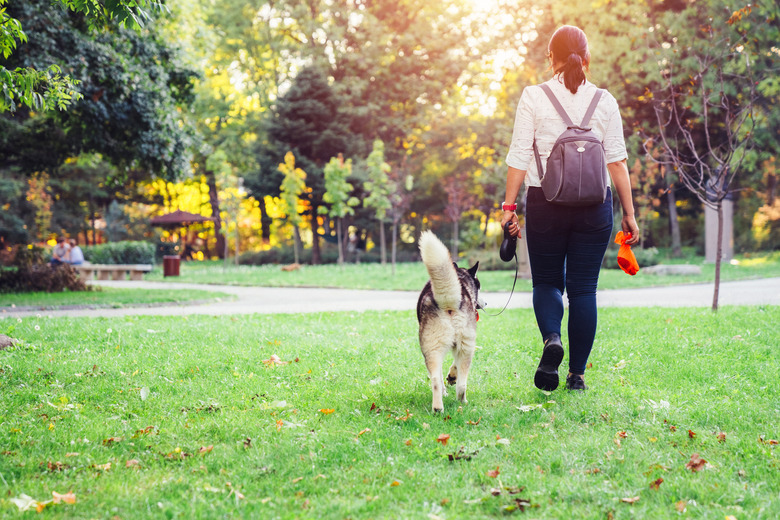How To Make A Dog Have A Bowel Movement
Your pooch probably knows to relieve themself as soon as you take them outside and should do so on a regular basis. However, if your dog won't poop, they may be constipated and will need some help to get things moving again. Dogs don't deal with constipation too often, but you can help your dog feel better by using a number of techniques to get them some relief.
Why is my dog constipated?
Why is my dog constipated?
You may notice a few signs indicating constipation in your dog. If your dog hasn't had bowel movements in few days or if they produce a hard, dry stool that feels like pebbles, then they likely have constipation. You may see your dog attempt to defecate a number of times while outside before giving up. This can also be a symptom of a urinary tract infection, though, so keep a close eye on things to determine what is really going on with your dog.
A constipated dog may strain to have a bowel movement without any result or may produce small bits of liquid stool mixed with blood. Watch your dog for signs that they are uncomfortable while defecating. You may also notice mucus in or around your dog's poop.
If you notice your dog has constipation, then start to pay attention to when they are able to relieve themself as well as the amount and consistency of their stool. Be sure to accompany your dog outside whenever they go to relieve themself so you can monitor whether they have a bowel movement, strain, or are unable to go.
Causes of dog constipation
Causes of dog constipation
There are many potential causes behind your dog's constipation.
- Fiber or exercise. Dogs can become constipated when they have too much or too little fiber in their diet or because of a lack of exercise.
- Grooming. Sometimes, excessive grooming can cause large amounts of hair to back up in your dog's poop, making it difficult for your furry friend to relieve themself. If your dog is obese, it is difficult for them to groom themself, and this can lead to matted hair around the anus.
- Eating something. If your dog has ingested gravel, bones, dirt, pieces of toys, or other foreign bodies, they can become lodged in the intestinal tract, contributing to constipation.
- Medical causes. Masses or tumors in your dog's rectum or a trauma to the pelvis can also make it difficult for your dog to relieve themself. If your dog has another illness, they may be dehydrated, which leads to hard feces. A dog who becomes constipated may have a neurologic disorder.
- Medication and surgery. Some medications can also have side effects that include constipation. Constipation may occur after a surgery, and stressful events can also contribute to a dog's constipation.
- Orthopedic problems. In some cases, dogs who have orthopedic problems may have difficulty getting into a position to defecate, and this can contribute to constipation.
Home remedies for dog constipation
Home remedies for dog constipation
There are a number of home remedies for dog constipation that you may already have on hand in your kitchen. You can try one of these home remedies at a time. Using more than one of these remedies at once can lead to diarrhea and dehydration. Pet parents should monitor their dog carefully since they may experience loose stool or mild diarrhea as these remedies start to work.
Try these home remedies for dog constipation:
1. Offer canned pumpkin (not pumpkin pie filling)
2. Offer coconut oil
3. Provide ground-up dark, leafy green vegetables
4. Add ginger to their food
Canned pumpkin is high in fiber and water but make sure to avoid using a pie filling or a puree that has added sugar. You can feed them 1 teaspoon of pumpkin per 10 pounds of their body weight. Offer the pumpkin once or twice per day on your dog's food. Alternatively, feed your dog 1 teaspoon of coconut oil per 10 pounds of their body weight once to twice daily to help lubricate their stool.
Ground, dark, and leafy vegetables are high in fiber, which can help to stimulate your dog's bowel movements. You can feed them 1 teaspoon of these vegetables per 10 pounds of their body weight once or twice a day. Ginger is another helpful home remedy. Add 1/4 teaspoon of ginger to 1/2 cup of chicken or beef broth and feed it to your dog.
Dog constipation home remedies to avoid
Dog constipation home remedies to avoid
While you will certainly want to do anything you can to help ease your dog's discomfort, there are some remedies that you should not try. You should never give your dog a human laxative or stool softener unless your veterinarian has given you specific instructions to do so. There are dog laxatives specially formulated for dogs, but again, use these only under your veterinarian's guidance.
Avoid these dog constipation home remedies because they aren't safe:
1. Never give human laxatives or human stool softener
2. Avoid high-fiber cereals and grains
3. Avoid letting them drink mineral oil and olive oil
4. Never give an enema or suppository
Fiber supplements including high-fiber grains, like cereals, are meant for humans, not dogs. These grains are not a part of your dog's natural diet, and they could make their constipation worse. Along those same lines, you might think that giving your dog mineral oil or olive oil to drink would help your dog, but it is not effective in easing constipation. Instead, your dog could inhale it into their lungs and suffer from permanent damage.
Lastly, never try to give your dog an enema or a suppository. Some enemas are toxic to pets, and you might harm your dog in the process. If your dog's constipation is so bad that you are considering these methods, then it is time to call your veterinarian.
Encouraging bowel movements in dogs
Encouraging bowel movements in dogs
Dehydration is one of the most common causes of constipation in dogs. You will need to carefully monitor your dog's water intake and remember that a very active dog needs to ingest more water. Dog owners should also increase a dog's water intake during hot weather. You may need to measure out your dog's water into their bowl to track how much they're actually drinking in a day.
Your dog's diet will also play a role in how much water they drink. Your dog will get some of the moisture they need through their meals, such as a raw or canned dog food. If your dog eats a diet that is mostly or all dry kibble, then they will need to drink more water to make up for what they do not get through their food. Increasing the amount of canned food you feed your pet can improve their hydration.
Exercise is also key to preventing constipation in dogs. Your dog's body needs physical activity and movement in order to keep the feces moving through the colon, so try increasing your dog's exercise and make sure that they get exercise on a daily basis. Certain dog breeds are higher energy and need more exercise than others. If your dog has a medical condition that is causing constipation, then prevention strategies may differ a bit. Always consult your veterinarian for strategies that are specific to your dog.
Keep track of your dog's symptoms
Keep track of your dog's symptoms
You may be able to relieve your dog's constipation at home, but in some cases, pet owners may need to seek veterinary treatment if the dog's problem does not resolve. If you do have to seek veterinary help, then the more information with which you can provide your veterinarian, the better your veterinarian will be able to treat your pet's health problems.
While treating your dog at home, write down important details, such as when your dog last had a normal bowel movement, the current color and consistency of their stool, any changes to their diet or routine, and any nonfood items that your dog may have been able to access and eat. You should also make a list of symptoms your dog is showing, such as if they are straining, vomiting, or lethargic or if they appear bloated. Write down any recent medications your dog has taken as well as any recent injuries.
Even if you do not think that your dog will need to go to the veterinarian, write down this information throughout your dog's treatment anyway so you can monitor the progress and so you do not forget any important details. If other people are caring for your dog, share the information with them, teach them what to look for, and ask that they add in information so that you have accurate records of your dog's progress.
When to seek veterinary help
When to seek veterinary help
Constipation can be a sign of some serious conditions, so it is a good idea to at least communicate with your veterinarian if your dog is constipated. If your dog's constipation is chronic or severe or if you are unable to relieve it at home, then it is time for an appointment with your veterinarian.
If you have administered a home remedy and your dog has loose poo or diarrhea, they could become dehydrated because of the amount of fluid that they lose in their stool. If you can't get their digestive system regulated, it is time to call your veterinarian.
For a dog who is still constipated, a veterinarian may administer fluids or a laxative. If your dog's constipation is extreme, then your veterinarian may prescribe a medication to activate their colon function, or your veterinarian may even manually remove impacted feces.
Treating severe canine constipation
Treating severe canine constipation
Constipation might appear minor, but if left untreated or unresolved, it can become a serious issue for your dog. Chronic constipation, known as obstipation, requires veterinary treatment. A dog with obstipation becomes unable to relieve themself, and their colon will swell because of the amount of feces it contains. The dog will lose their appetite, become lethargic, and start to vomit.
If your dog's constipation does not resolve within a day or two, then it is time to go to the veterinarian. The same is true if your dog's constipation resolves but then returns after a few days. Obstipation can be life threatening, and constipation can indicate a variety of health problems, so be sure to get your dog veterinary help. If you notice other symptoms, such as lethargy, loss of appetite, vomiting, or fever, then your dog needs to be seen by a veterinarian right away.
In extreme situations, your dog may need surgery. This is usually done when constipation is caused by an injury to the bowel or an issue in the bowel. During surgery, part of the bowel may be corrected or removed to remove any blockages and relieve the constipation.
The bottom line
The bottom line
Most of the time, constipation in dogs is pretty infrequent and can be resolved with home remedies. A diet containing plenty of canned dog food and water and frequent exercise can prevent dog constipation. However, if your dog's constipation persists, you may need to take additional measures, such as feeding them extra fiber or coconut oil. If home remedies don't do the trick, do not try using medications like enemas or laxatives. Instead, contact your veterinarian. Constipation can signal underlying health problems that can be harmful to your pet if unaddressed. If you ever have any concerns about your dog's health, do not hesitate to call your DVM.


